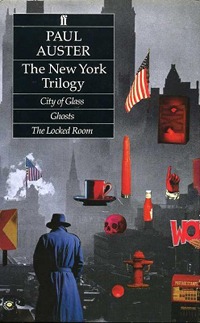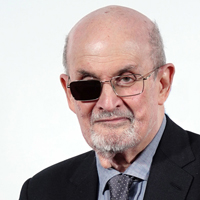 A giant of American letters, although arguably more popular in Europe, has died. Paul Auster made his mark with his New York Trilogy, three novels which twist the tropes of detective fiction in postmodern ways. Along the way, they explore writing itself, intertextuality, autobiography and philosophy.
A giant of American letters, although arguably more popular in Europe, has died. Paul Auster made his mark with his New York Trilogy, three novels which twist the tropes of detective fiction in postmodern ways. Along the way, they explore writing itself, intertextuality, autobiography and philosophy.
As Auster himself said, in his fiction he was ‘interested in inventing new ways to tell stories. I wanted to turn everything inside out.’ As this consideration of his work suggests, this led to Auster ‘marrying tricksy European post-modernism with hard-boiled American noir, to create something dizzyingly inventive and new.’
Read an obituary of Paul Auster here.
Rushdie’s Survival
 Meanwhile, Auster’s close friend and fellow writer Salman Rushdie continues to make his recovery from the brutal attack he suffered in August 2022. The physical recovery has been a slow painful process, assisted by a remarkable medical team. Another part of that process has been writing about the attack, which he was reluctant to do or a long time.
Meanwhile, Auster’s close friend and fellow writer Salman Rushdie continues to make his recovery from the brutal attack he suffered in August 2022. The physical recovery has been a slow painful process, assisted by a remarkable medical team. Another part of that process has been writing about the attack, which he was reluctant to do or a long time.
Now, though, Knife: Meditations After an Attempted Murder has been published, in frank, sometimes gruesome detail. Rushdie was determined to be honest and leave nothing out, though the book does contain a chapter of an imagined dialogue between himself and his attacker.
Here is a review of the book. It is also a good idea to read this interview with Rushdie about the book, his experience and thoughts which arise from it. There are some key lines which provoke thought. The attack on Rushdie seems to have been motivated by his work, as was the original fatwa on him, and he remains deeply committed to the principles of free speech, even if that freedom might occasionally cause offence to others:
… when somebody says something that you really, really don’t like, that’s when you discover if you believe in free speech or not.
He is also a passionate defender of the arts, promoting their importance to our daily lives, whether through drawings, paintings, graffiti, music, TV, film, theatre, books – all are essential to who we are as expressive human beings:
We all need [art] every day, and to think of it as some kind of frippery is to misunderstand the nature of human society.